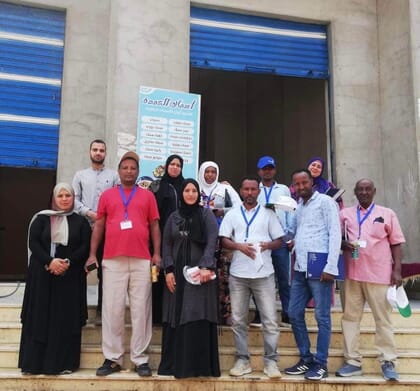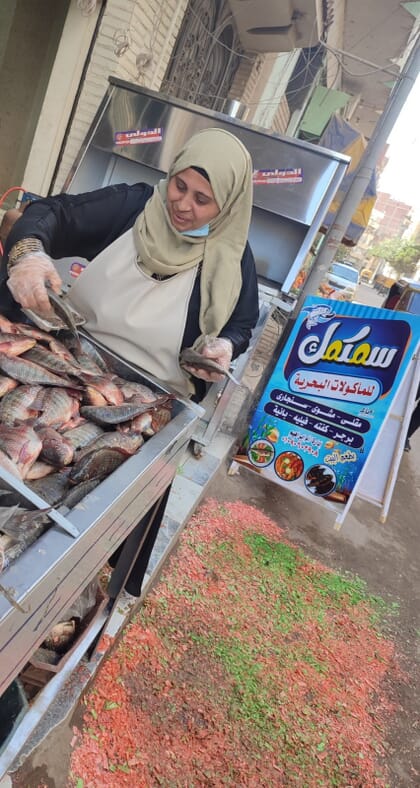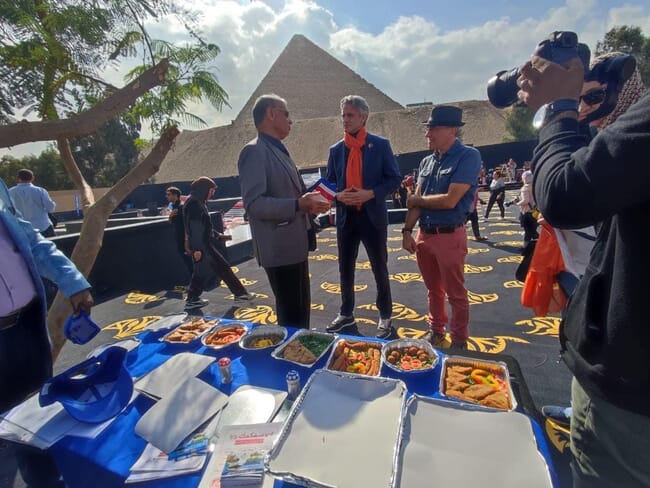
© WorldFish
Can you give a brief overview of the project?
Empowering Women Fish Retailers in Egypt (EWFIRE) is being led by WorldFish Egypt, in cooperation with the Life Maker Association for Community Development, Zagazig University and the Business Women’s Economic Council of Sharkia, with funding support from EuropeAid.
It aims to provide poor female fish retailers with training on product development, whilst supporting community market development. Additionally, the scheme aims to accelerate the growth of 50 existing women-led companies, and provide sustainable and profitable business models for women entrepreneurs in Sharkia Governorate.
Why was the project established?
The project was aimed at improving fish production, increasing the value of farmed fish, improving the social conditions of women and giving them formal work.
Informal retailers play a dominant role in providing low-value fish products to low-income consumers. But this represents a difficult way for women to make a living, especially as they face exploitation in the fish markets.
How does it relate to WorldFish’s other activities in Egypt?
There are other initiatives, such as the Youth Employment in Aswan Governorate (YEAG) and the Sustainable Transformation of Egypt Aquaculture to Market System (STREAMS) projects which are partly aimed at improving the conditions of women who process fish waste, especially fish skins, transforming the waste into handmade products.
Around 140 women fish retailers in Aswan reported improved working conditions. They were provided with ice boxes, cleaning equipment, weighing scales and umbrellas; as well as training on fish filleting, cooking, salting, smoking, handling, tanning, and project management.
We also have an upcoming project, the Center for Renewable Energy in Aquaculture (CeREA), which is trying to integrate women with climate-smart and cost-effective renewable energy solutions.
How do you select participants?
We asked community associations to suggest women fish retailers. We went to the markets and communicated with 258 women about the project’s purpose, and the services it will provide.
We had two types of training, basic training that all women took on post-harvest treatment, then the training of trainers (ToT) model. 77 women received ToT training, some of whom worked in the companies that were established for women retailers.
After completing the procedures, five companies were established in five urban areas across the Sharkia governorate (Zagazig, Faous, Belbeis, Al-Hussainya and Abu-Kebeer), which were equipped with processing and storage facilities. Funding support was provided by EuropeAid for a total of 150 women beneficiaries.

© WorldFish
What were the main challenges and how have these been overcome?
The biggest challenge was gaining the trust of the women – most of them did not believe that anyone would give them training, improve their skills and help them start their companies for free.
So, we first spoke to them in their original places and then visited them more than once throughout the training period to get to know them. At first, they started bringing their families to the meetings because they were afraid, but we made a condition that, while this was fine, only the women retailers actually joined the training sessions. Over time we gained their trust until they became the ones asking to come and take part.
What challenges still remain?
We are still not reaching more marginalised regions. Also, while we provide moral and financial support, participants don’t always apply their learning to their own businesses. It takes time for them to become entrepreneurs, but they need to realise that they are the owners of their businesses and so are responsible for making the necessary changes.
We also need to do more to create a link between the retailers and hypermarkets and restaurants, but they will need to add barcodes and nutritional specifications to their products to create the necessary distribution rings.

© WorldFish
How has the project been received - both by participants and by the wider community?
In the beginning, there was opposition from women retailers as they previously expected to sell fish directly without any processing, and they didn’t yet know and trust our organisation.
However, they soon began to understand that it was more beneficial to process fish instead of selling it quickly at a lower price to prevent spoilage.
Meanwhile civil and local society partners and the Egyptian government welcomed the idea and provided a lot of assistance. And there was also buy-in from consumers after we participated in many exhibitions to display the products.
What would you like the legacy of the project to be?
The project conveyed the targeted message and improved the status of women and the prevailing conditions in the fish markets in the Sharkia Governorate. It increased profitability and at the same time spread the culture of fish processing. Most importantly, it transformed marginalised retailers who worked informally into entrepreneurs who were able to double their capital investment since January 2022, when the project became fully operational.
We hope that these women will maintain their financial sustainability and we will continue to provide support and open new ways for women to achieve more progress.
How is Egypt’s aquaculture sector performing, and what areas show the most promise?
One of the most important things that made aquaculture in Egypt distinctive is that the government made the land available for fish farming and hatcheries around the lakes. At the same time, specialised feed factories and model aquaculture farms were established, while WorldFish and the Central Laboratory for Freshwater Research focused on capacity building.
One of the most widespread fish production systems is the semi-intensive farming in earthen ponds, but we are now helping to develop more intensive aquaculture systems, including cage culture and in-pond raceway systems (IPRS). It is also important to conduct more research on genetically improved tilapia strains paving the way for enhanced productivity and quality and integration of renewable energy sources into aquaculture practices.
WorldFish has been building capacities of blue economy’s partitioners and aquaculturists since 1999 through its various capacity-building in-person and virtual programs and we are redefining the aquaculture landscape in Egypt and beyond, embracing sustainability in this vital sector.




